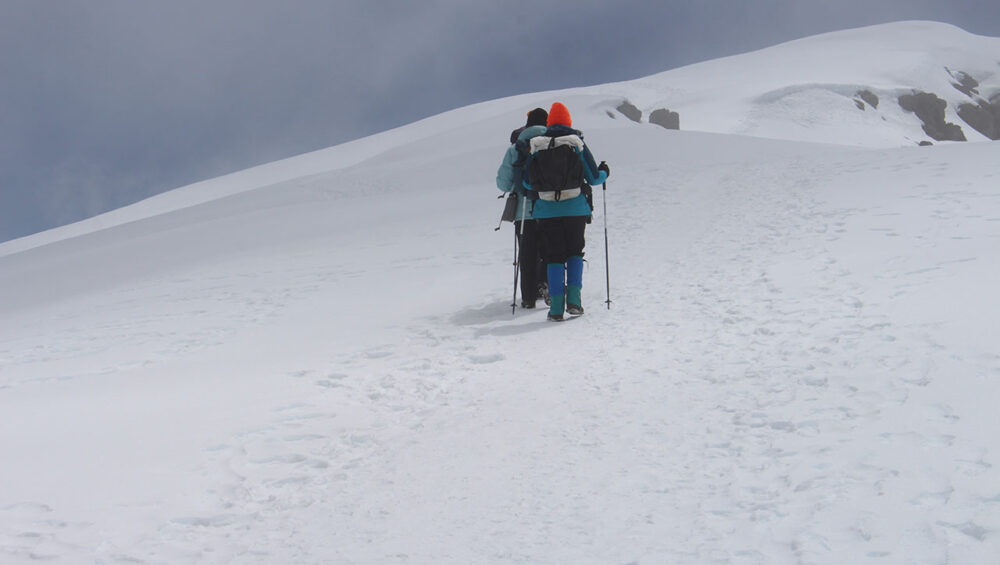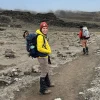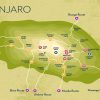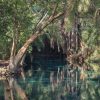Each climber on Mt. Kilimanjaro is required to pay park fees, which constitute conservation, camping, rescue, and crew fees. On Lemosho and Rongai routes special forest fees are also applicable. It is another key element of Mt Kilimanjaro’s climbing cost.
Be aware that some unethical tour operators deliberately provide misleading information regarding Kilimanjaro park fees.
Never trust claims that it is possible to climb Mt. Kilimanjaro and avoid fees by bypassing ranger posts. It is simply impossible to reach Uhuru Peak avoiding any encounters with park rangers. Some of those who try to attempt this are caught every year.
Each climber on Mt. Kilimanjaro is required to pay park fees.
Furthermore, it is dangerous. Bypassing established official routes where climbing permits are checked at each ranger post will bereave you of the possibility of receiving timely assistance from the rangers should such a necessity arise.
Lastly, it is unlawful. Trespassing to National Parks is considered a serious offense in Tanzania. The best-case scenario entails being bereft of the chance of ever experiencing the wonders of Tanzania again after being deported and stiff fines. Imprisonment is also not to be ruled out.
Listed are the park fees for various common routes. This figure does not include guide and porter entrance fees.
Machame 6 days = USD 814.20 per trekker
Machame 7 days = USD 955.80 per trekker
Lemosho 7 days = USD 955.80 per trekker
Lemosho 8 days = USD 1097.40 per trekker
Marangu 5 days = USD 719.80 per trekker
Marangu 6 days = USD 873.20 per trekker
Rongai 6 days = USD 814.20 per trekker
Rongai 7 days = USD 955.80 per trekker
Umbwe 6 days = USD 814.20 per trekker
Umbwe 7 days = USD 955.80 per trekker
What are the various components of the park fees?
Kilimanjaro park fees comprise various components. It depends on how many days and how many nights you spend inside the park. Here are a few major ones.
Conservation Fees
Fees charged by the park department for the upkeep of the national park are USD 70 per trekker per day. Charged for the number of days you spend inside the park. For e.g., on 8 days Lemosho route, the conservation fees would be USD 560 (USD 70 x 8 days).
Camping Fees
On all routes except Marangu, you would be camping at the public campsites. These campsites as well as common areas such as toilets are maintained by the park department. The camping fees is USD 50 per trekker per night. This is charged for the number of times you camp on a trip. Continuing the previous example, on an 8-day Lemosho trip, you would be camping for 7 nights. So the camping fees would be USD 350 (USD 50 x 7 nights).
Hut Fees
On the Marangu route, you would be sleeping in huts along the route instead of camping. High altitude maintained huts by the park department. Some of the huts are Mandara, Horombo, and Kibo. The hut fees is USD 60 per trekker per night. So on a 6-day Marangu route, hut fees would be USD 300 (USD 60 x 5 nights).
Rescue Fees
Charged by the park department to provide rescues on the mountain. The current cost is USD 20 per trekker per trip.
Crater Camping Fees
In case you wish to camp on the crater, the cost would be USD 100 per trekker per night.
Guide and Porter Entrance Fees
In addition to paying park fees for yourself, you are also responsible for paying the park entrance fees for your crew, your guides, cooks, and porters. The park entrance fee is USD 2 per trip per person.
VAT
There’s a Value Added Tax (VAT) charged by the government of Tanzania. The government started charging VAT on Kilimanjaro treks in July 2016. Currently, it’s set at 18%. All the components above would have to be charged with 18% VAT.
How to calculate the park fees?
Now that we know all the components of the park fees, it’s trivial to calculate how much the amount will be.
Let’s say you are doing an 8-day Lemosho route. This would mean you would be spending 8 days and 7 nights on the mountain. On the Lemosho route, you would be camping at the public campsites. So here is how you would calculate the Kilimanjaro park fees.
Conservation fees = USD 70 x 8 days = USD 560 per trekker Camping fees = USD 50 x 7 nights = USD 350 per trekker Rescue fees = USD 20 Total (exclusive of taxes) = USD 560 + USD 350 + USD 20 = USD 930 VAT = 18% of USD 930 = USD 167.40 Total (inclusive of taxes) = USD 930 + 167.40 = USD 1097.40
Let’s take another example for Marangu’s 6 days. On the Marangu route, you would be spending the 5 nights in huts instead of camps.
Conservation fees = USD 70 x 6 days = USD 420 per trekker Camping fees = USD 60 x 5 nights = USD 300 per trekker Rescue fees = USD 20 Total (exclusive of taxes) = USD 420 + USD 300 + USD 20 = USD 740 VAT = 18% of USD 740 = USD 133.20 Total (inclusive of taxes) = USD 740 + 133.20 = USD 873.20
How to pay the park fees?
You have two options when it comes to paying the park fees.
The most common and popular option is to pay the park fees upfront to us, along with the trek fees. All prices on our website include park fees as well as VAT. We will then pay the park fees to the park department.
Another option is to pay the park fees directly to the park department. You can do this with any Visa card at the park gate. You would be doing this on the first day of the climb at the park gate we would be entering from.
While booking, you can indicate your preference to us on how you wish to pay the park fees.
What are the discounts available from the park department?
The park department offers discounts for children under the age of 16 years at the time of the climb, residents, and ex-pats of Tanzania and East African citizens. Let’s look at these discounts in detail.
Children aged between the age of 5 and 15 years
Children aged between the age of 5 and 15 years get a discount on conservation fees as well as camping fees. There is no discount on hut fees or rescue fees.
Conversation fees are USD 20 per day.
Camping fees are USD 10 per day.
Hut fees are still USD 60 per day.
No change in rescue fees. Rescue fees are still USD 20 per trip.
Children below the age of 5 years
The park department charges no conservation fees or camping fees for children below the age of 5 years. Hut and rescue fees are still applicable.
No Conversation fees.
No Camping fees.
Hut fees are still USD 60 per day.
No change in rescue fees. Rescue fees are still USD 20 per trip.
Expatriates/Residents living in Tanzania
If you are an expatriate or a resident living and working in Tanzania, the park department discounts your conversation fees. There are no discounts on camping fees, hut fees, or rescue fees.
Conversation fees are USD 35 per day.
No change in camping fees. Camping fees are still USD 50 per day.
No change in hut fees. Hut fees are still USD 60 per day.
No change in rescue fees. Rescue fees are still USD 20 per trip.
East African Citizens
You can get discounts if you are a national of Tanzania, Kenya, Uganda, Burundi, Rwanda & South Sudan. Please note that this is applicable to the citizens of these countries and not residents. If you are a national of one of these countries, you must produce your passport at the entry gate.
We charge you the exact park fees charged by the park department. We have no markups. You are free to pay the park fees directly to the park department as well on the first day of the climb at the different park gates. Prices on the website are inclusive of the Kilimanjaro park fees listed above as well as VAT to give you a true and transparent picture of the costs.
Source
Tanzania National Parks – Park Fees and Regulations
Tanzania National Parks – Park Fees and Regulations for EAC Citizens



